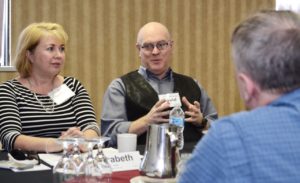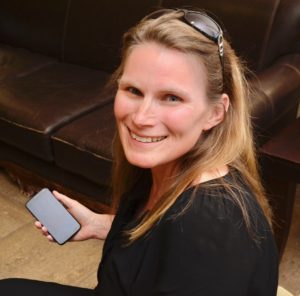|
Getting your Trinity Audio player ready...
|
For Craig McNiven, the timing was perfect. With about a year behind him on the board of Carizon, a family and community services agency in Waterloo Region, Ont. McNiven enrolled in Capacity Canada’s Manulife Board Governance BootCamp last November.
He graduated this week (March 9), and now applies what he learned to two key responsibilities on the board: vice-chair, and head of the governance committee.
“For someone like me, it was hugely beneficial,” McNiven said. “I didn’t know a lot about board governance, and then I get these roles, so I had to learn a lot. It was a steep climb.”

Capacity holds Governance BootCamps across the country for top administrators and board members in the charitable non-profit sector.
The one in Waterloo Region, in partnership with Manulife, is the flagship event, launched in 2009. McNiven himself is a Manulife executive who connected with Carizon through another Manulife/Capacity venture — MatchBoard.
Capacity’s BootCamps typically involve a long weekend of work with a follow-up a few months later to see how participating agencies did with a homework assignment.
For Carizon, that meant a deep dive into risk management. McNiven said the organization did a “heat-mapping” exercise to plot its exposure points. Risk management will be wired into Carizon’s next strategic plan.
“We had never looked at the risks facing the organization on the whole,” McNiven said. “I think we knew in the back of our minds that we should do it, but we didn’t have a reason to focus on it.
“This BootCamp forced us to confront it and do something about it.”
At 19 organizations and 40 participants at graduation, the 2016-17 Governance BootCamp cohort in Waterloo Region is the among the largest in the program’s history.
The goal is to double participation for the next Waterloo Region session in November, said Cathy Brothers, Capacity’s chief executive officer.
On follow-up day March 9, participants split into small groups to talk about what happened with their assignments. Those discussions covered such issues as setting policies and making sure boards and administrations understand their respective roles. Boot campers are often told to aim for a “noses in, fingers out” relationship by which a board knows what its organization does, but leaves day-to-day operations to paid staff.
They also examined the delicate topics of dealing with calcified administrators and weak board members.
One common theme that came up among the groups: we didn’t know what we didn’t know.
These days, “there is a heightened emphasis on accountability,” said Fred Galloway of F.J. Galloway and Associates Inc. of London, Ont., lead faculty for Capacity’s Governance BootCamps. Funders and donors have raised the bar on how they expect boards to perform.
Boards have to shape policies, plan for the departure of old leaders (and the succession of new ones), and mind what they say in an age where social media can destroy an organization’s reputation with one malevolent post.
But, Galloway said, organizations need to pace themselves en route to improvement.
“How do you eat an elephant? One bite at a time,” he said.
• • •

BootCamp footnote: Fiona Beardwood, who chairs the governance committee on the board of Habitat For Humanity Waterloo Region, is the 2016-17 BootCamp cohort’s highest scoring participant on CapacityGO.
Built on an e-learning platform developed by Waterloo, Ont.-based Axonify Inc., CapacityGO reinforces BootCamp training through a series of short quizzes on governance. It throws in gamification and some friendly competition to add interest.
The app can be used on smartphones, tablets and desktop/laptop computers. Beardwood said she often started her day by answering the app’s latest quiz.
“It was a great learning experience, and painless,” she said. “Just three questions a day,” she said.

